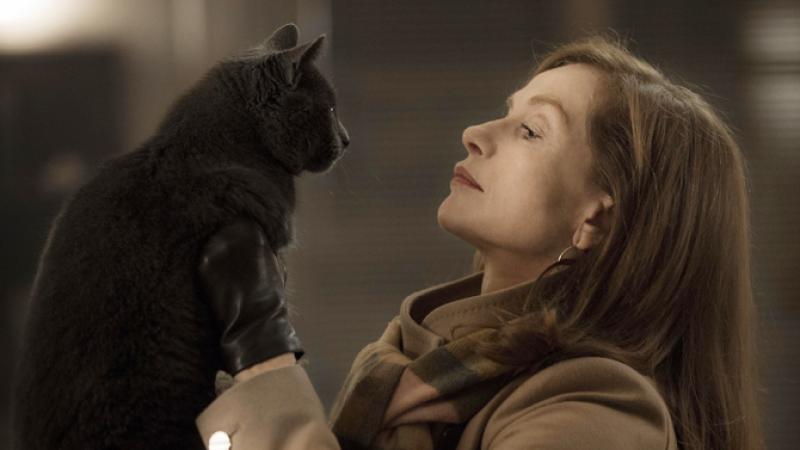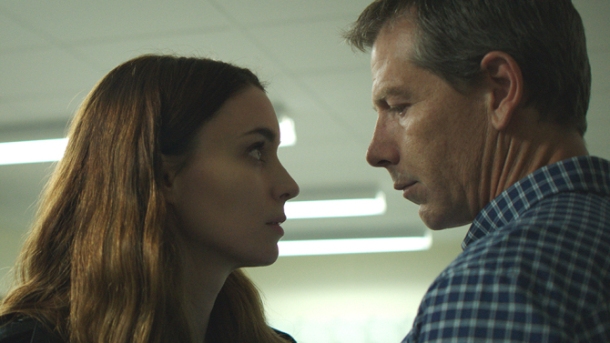LFF 2016: Elle/Paterson | reviews, news & interviews
LFF 2016: Elle/Paterson
LFF 2016: Elle/Paterson
Verhoeven, Jarmusch and a double-dose of Huppert, as the London Film Festival continues

Paul Verhoeven directing Isabelle Huppert as a woman seemingly unfazed by a violent rape sounds a recipe for outrage. Elle (★★★★) , though, provokes in subtle, lingering, sometimes comic ways. The rape of Michele (Huppert) mostly happens off-screen during the opening credits, though the ski-masked intruder’s violence in her plush, gated Paris house will be replayed as memory and fantasy.
Michele isn’t really so blasé – she sweeps up clumsily, surely in shock. But her reaction to being raped is merely one facet of a woman who just doesn’t care what people think. Whether barking with laughter at her mother (partial to “un petit Botox”) announcing marriage to a gigolo toyboy, or kicking a bin into position to give an office hand-job to her best friend’s husband, Michele is powerfully shameless. Verhoeven brings the gloss of his Hollywood phase making cruder provocations such as Basic Instinct, and an ironic intelligence which keeps the ground shifting under our feet, as Michele makes the rapist’s place in her life dizzyingly perverse. Huppert’s cool refinement covers a huge range of behaviour without fuss, in what even for her is an iconoclastic, revolutionary role. There are psychological gaps left to fill in, mysteries this character is big enough to fill. Funny and tense, it’s a film that grows in the mind.
Jim Jarmusch’s Paterson (★★★★★) pushes none of Elle’s hot buttons, but is as rich in its own quiet way. Adam Driver proves his tremendous versatility as Paterson, a bus driver-poet in the New Jersey town which shares his name. His girlfriend, Laura (Golshifteh Farahani, pictured below with Driver), is a lively dreamer, flitting from cupcakes to country singing in her desire to create. She’s a tiring but loving comfort as Paterson drags himself with incrementally growing reluctance through the working week. Their closeness and kindness to each other are shown with rare conviction.
 The poems Paterson writes on his breaks are also crucial to a man of passive, generous restraint (a photo from Driver’s own past as a Marine suggests why he’s this way). His bus-driving during a lovely, sunny week lets him overhear conversations that make him smile. The bar the couple’s malevolent pet bulldog drags him to each evening, meanwhile, is an ideal one, with a paternal owner who’s banned TV, stocks a great jukebox, and pins all the cultural heroes from this supposed backwater on the wall. Jarmusch slips in all the dry running gags and eccentric touches you’d expect, while little happens beyond a man going to work, with his private poetry, loved one and a nightly beer to look forward to. This is a sublime film about the democratic consolation of art, and of one another.
The poems Paterson writes on his breaks are also crucial to a man of passive, generous restraint (a photo from Driver’s own past as a Marine suggests why he’s this way). His bus-driving during a lovely, sunny week lets him overhear conversations that make him smile. The bar the couple’s malevolent pet bulldog drags him to each evening, meanwhile, is an ideal one, with a paternal owner who’s banned TV, stocks a great jukebox, and pins all the cultural heroes from this supposed backwater on the wall. Jarmusch slips in all the dry running gags and eccentric touches you’d expect, while little happens beyond a man going to work, with his private poetry, loved one and a nightly beer to look forward to. This is a sublime film about the democratic consolation of art, and of one another.
Watch list
Souvenir – Huppert won’t get nearly as much attention for her second film of the Festival, as a singer who came second to Abba at Eurovision, lured out of an anonymous retirement spent robotically adding garnish at a pâté factory by a besotted, 21-year-old boxer who becomes her lover and manager. But her performance as Liliane is just as enjoyably fine. It’s a breezy romcom, full of gauzy romance, wish-fulfilment, a great faux-Eurovision soundtrack by Pink Martini, and a May-December romance that reverses genders to little comment. Huppert is deadpan funny like Buster Keaton, and still deep and true. (★★★)
 Una – Benedict Andrews’ film of a David Harrower play stars Rooney Mara and Ben Mendelsohn, pictured right, and investigates sexual abuse with wrong-footing precision. Its sense of threat is constant, from the huge, looming canyons of Mendelsohn’s warehouse workplace to the reversals of power between its ruined pair, linked forever by a relationship when Mara’s character was 13. Andrews weds theatrical intimacy to brooding cinematic scale, as both leads go all-out. Una understands both of them rather than explicitly condemning, giving nuance and tension to its final judgement. (★★★★)
Una – Benedict Andrews’ film of a David Harrower play stars Rooney Mara and Ben Mendelsohn, pictured right, and investigates sexual abuse with wrong-footing precision. Its sense of threat is constant, from the huge, looming canyons of Mendelsohn’s warehouse workplace to the reversals of power between its ruined pair, linked forever by a relationship when Mara’s character was 13. Andrews weds theatrical intimacy to brooding cinematic scale, as both leads go all-out. Una understands both of them rather than explicitly condemning, giving nuance and tension to its final judgement. (★★★★)
Explore topics
Share this article
Subscribe to theartsdesk.com
Thank you for continuing to read our work on theartsdesk.com. For unlimited access to every article in its entirety, including our archive of more than 15,000 pieces, we're asking for £5 per month or £40 per year. We feel it's a very good deal, and hope you do too.
To take a subscription now simply click here.
And if you're looking for that extra gift for a friend or family member, why not treat them to a theartsdesk.com gift subscription?
more Film
 The Room Next Door review - Almodóvar out of his comfort zone
The Spanish director's meditation on mortality is a beautiful misfire
The Room Next Door review - Almodóvar out of his comfort zone
The Spanish director's meditation on mortality is a beautiful misfire
 Blu-ray: The Outcasts
A forgotten Irish folk horror is eerily magical and earthed in the soil
Blu-ray: The Outcasts
A forgotten Irish folk horror is eerily magical and earthed in the soil
 London Film Festival 2024 - Nickel Boys, crime and punishment and Ukraine
Colson Whitehead's Pulitzer-winner adapted, a Belgian serial killer, Chinese odyssey and sexist Indian police in our final round-up
London Film Festival 2024 - Nickel Boys, crime and punishment and Ukraine
Colson Whitehead's Pulitzer-winner adapted, a Belgian serial killer, Chinese odyssey and sexist Indian police in our final round-up
 London Film Festival 2024 - a shaman and sham
Warren Ellis saves wildlife and himself, Pavement go post-modern in two music docs
London Film Festival 2024 - a shaman and sham
Warren Ellis saves wildlife and himself, Pavement go post-modern in two music docs
 Documentary highlights from the 2024 London Film Festival
A close look at insightful new non-fiction films about single motherhood, visionary photographers, scam artists, legacies of colonialism, and more
Documentary highlights from the 2024 London Film Festival
A close look at insightful new non-fiction films about single motherhood, visionary photographers, scam artists, legacies of colonialism, and more
 Venom: The Last Dance review - Tom Hardy's people-eater bows out
Poignancy studs the digital punch-ups as the super-alien saga concludes
Venom: The Last Dance review - Tom Hardy's people-eater bows out
Poignancy studs the digital punch-ups as the super-alien saga concludes
 theartsdesk Q&A: director Jacques Audiard on his Mexican trans gangster musical 'Emilia Pérez'
The French filmmaker concocted an extravagant genre mash-up to confront the tragedy of Mexico's 'disappeared'
theartsdesk Q&A: director Jacques Audiard on his Mexican trans gangster musical 'Emilia Pérez'
The French filmmaker concocted an extravagant genre mash-up to confront the tragedy of Mexico's 'disappeared'
 London Film Festival 2024 - Angelina Jolie does Maria Callas
Plus John & Yoko in New York, Elton in LA and Pauline Black in Coventry
London Film Festival 2024 - Angelina Jolie does Maria Callas
Plus John & Yoko in New York, Elton in LA and Pauline Black in Coventry
 Emilia Perez review - Audiard's beguiling musical tribute to Mexico's women
Exceptional female cast gives this 'comedy' a serious, angry core
Emilia Perez review - Audiard's beguiling musical tribute to Mexico's women
Exceptional female cast gives this 'comedy' a serious, angry core
 Dahomey review - return of the king
Looted artefacts' repatriation gains soulful Afrofuturist resonance in Mati Diop's doc
Dahomey review - return of the king
Looted artefacts' repatriation gains soulful Afrofuturist resonance in Mati Diop's doc
 Milisuthando review - exorcising apartheid
Poetic consideration of a complex girlhood in white South Africa's black 'homelands'
Milisuthando review - exorcising apartheid
Poetic consideration of a complex girlhood in white South Africa's black 'homelands'
 theartsdesk Q&A: Anna Bogutskaya on her new book about the past decade of horror cinema
In time for Halloween, the author discusses 'Feeding the Monster' - and why she thinks horror cinema has entered a new phase
theartsdesk Q&A: Anna Bogutskaya on her new book about the past decade of horror cinema
In time for Halloween, the author discusses 'Feeding the Monster' - and why she thinks horror cinema has entered a new phase

Add comment